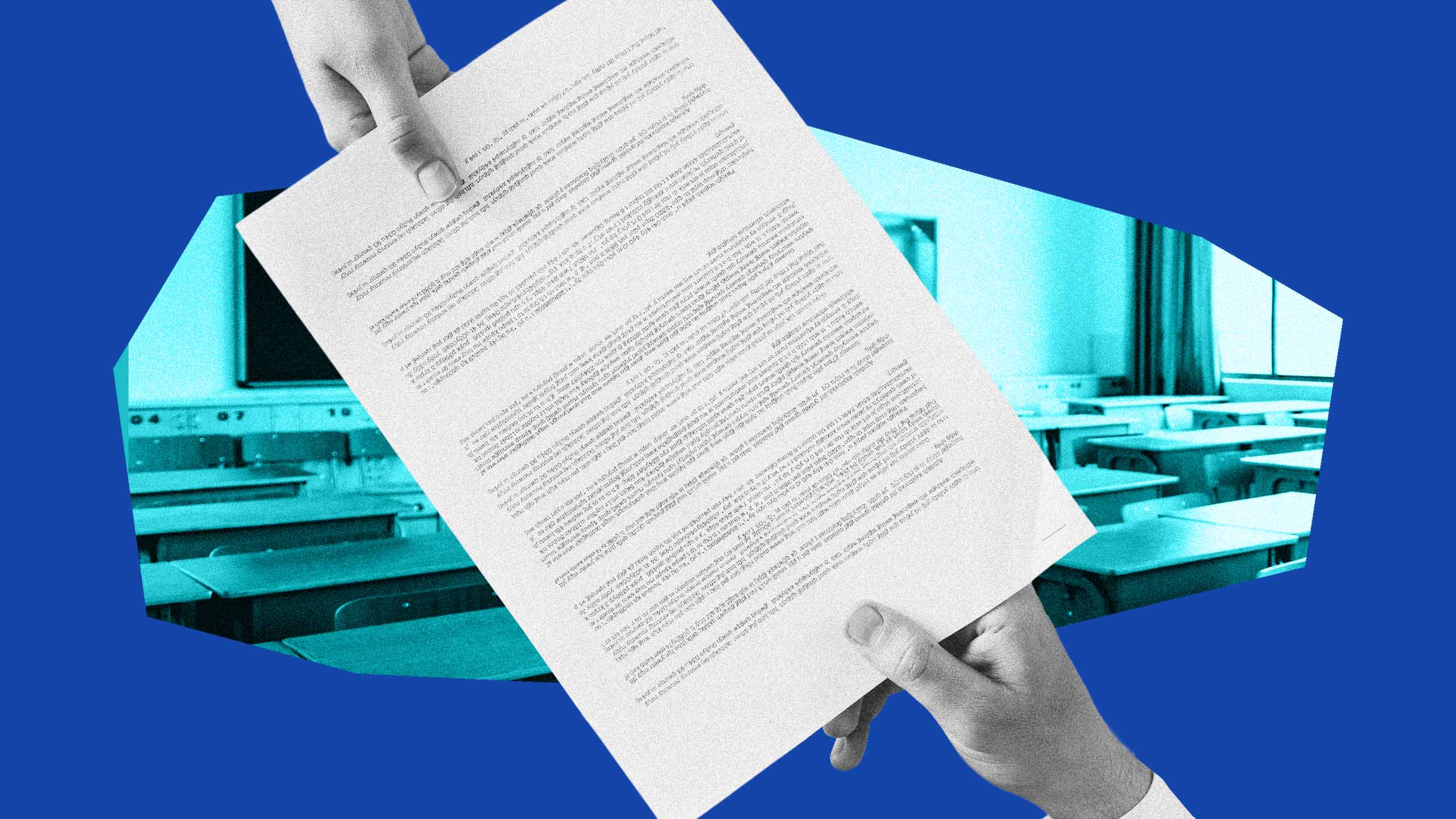Over the past year, far-right groups have been encouraging thousands of their followers to attend rallies like the 1 Million March 4 Children and protest at school board meetings, but they also have another tool in their kit that has its roots in right-wing conspiracy movements—notice of liability forms.
The forms, promoted by groups like Action4Canada and Stand4Thee, claim to enable parents who disagree with the teaching of sexual orientation/gender identity (SOGI) curriculum in public schools to threaten teachers and school administrators with legal action and collect up to $35,000 from them in small claims court.
Hazel Woodrow, a writer and researcher with the Canadian Anti-Hate Network, says even though the notices are legally dubious, they serve another purpose: intimidation.
Woodrow says that questions of legality may not matter “because if a school or a teacher receives a coordinated deluge of these forms, then they may just think, ‘Okay, it’s just easier not to do this lesson plan,’” she says. “It’s a strategy that these movements have been using for a very long time.”
Leaders of far-right groups tout recent policy changes as proof that notices of liability work, but experts told Xtra that these notices rely more on scare tactics than legal standing.
What is a notice of liability?
Stand4Thee and Action4Canada, two groups that participated in the “Freedom Convoy” and 1 Million March 4 Children rallies, promote notices of liability on their website.
“The goal is to go after the ones directly causing the harm to have the biggest impact—folks will not want to take on risk of liability,” reads Stand4Thee’s online guide to developing a notice of liability.
The forms provide examples of what they consider harm, including the raising of Pride flags at schools, proclaiming Pride Months and the creation of gender-neutral washrooms.
The last example of harm states that the child of the person presenting the notice “suffered trauma by being subject to sexual programming incited by the World Health Organization/United Nations is showing initiatives to force schools to groom our children with sexual activity at ages 0 to 12.”
The guide says that once the forms have been filled out and signed by a commissioner at a courthouse, issuers are to serve the notice to the individual causing harm and give them a clear time frame—seven days is suggested—to rectify the matter. After that time frame has passed, “you can file your small claim collection.”
The following section, on “private collections,” notes that collection can include, but is not limited to, engaging a collection agency to do the chasing, reporting the individual to credit companies, liening their home and boycotting or picketing “the establishment that has hired and instructed the worker to violate your rights to informed consent and privacy.”
Debra Parkes, a law professor at the University of British Columbia, told Xtra that determining liability in advance is simply not part of the legal system in Canada.
“They’re nonsense,” says Parkes. “I don’t see any reasonable way these could be construed as legally enforceable.”
Parkes says she’s concerned that people seem to be under the impression that these notices, which equate teaching SOGI curriculum with exposing children to pornography, are legal documents.
“If they feel their rights are being violated, that’s what the courts are for: to adjudicate those claims on the merits,” she says. “But simply saying in advance that, ‘you as a school board trustee are violating my rights, or my children’s rights, by having a SOGI policy,’ that is not something that is legally enforceable in any way.”
Parkes says that while issues of human rights often involve a balancing of the rights of different groups, such as the rights of parents and those of their children, there is a strong basis of support for SOGI policies in schools.
“The law favours and supports SOGI efforts in schools and SOGI policies because discrimination on the basis of sexual orientation and gender are prohibited grounds of discrimination both in [provincial] Human Rights Codes and in the Charter,” Parkes explains.
During a segment of her weekly Empower Hour webinar on Nov. 1, Action4Canada founder Tanya Gaw explained that a disclaimer has been added to the Action4Canada SOGI notice of liability form because she “spoke to an MLA who was concerned that teachers who are on our side would receive this and think that we were immediately taking legal action against them.”
The disclaimer claims many Canadians are being compelled to participate in teaching a “dangerous ideology” that may cause permanent physiological and psychological harm to children.
“The notice of liability is to warn people that what they’re doing is either causing harm or unlawful,” she says. She says that regarding SOGI, “it’s both: it’s causing harm and it’s illegal.”
Tanya Gaw and Action4Canada did not respond to Xtra when contacted for comment.
Connections to other movements
Woodrow says forms like the notices of liability originate in far-right conspiracy movements like the sovereign citizens, who are sometimes referred to as “freemen on the land.” They believe the laws of Canada don’t apply to them.
The tactic of sending supposedly legal notices to people or organizations believed to have violated their rights is sometimes referred to as “lawfare” or “paper terrorism.” The idea behind this strategy is “if you use the right language, say the right thing, submit the right form, you actually have more power over systems and social structures than ‘they’ want you to know,” Woodrow explains.
These notices often use language that is not used in authentic legal documents. Action4Canada’s notice of liability identifies both the person presenting the notice and the person on the receiving end as “private human living souls.” This phrase appears on other notices of liability regarding workplace vaccine requirements as well as a “notice of liability for the act of treason” regarding World Economic Forum/United Nations sustainable development goals for 2030, which are sometimes connected to the idea of “15-Minute City” plans.
Carmen Celestini, a professor of religious studies at the University of Waterloo, whose research focuses on Christian apocalyptic thought and conspiracy theories, says sovereign citizens were very involved in the anti-mask, anti-vaccine and “freedom convoy” movements that sprung up in the first few years of the pandemic. These groups found common cause in the convoy, leading to what Celestini calls a “conspiracy convergence.”
“It’s kind of like the Moral Majority of the 1980s: it didn’t matter what Christian denomination or dogma you belonged to, it was a sense of values,” Celestini explains.
The early years of the pandemic saw an increase in the use of notice of liability forms to push back against mask and vaccine mandates. Both Action4Canada and Stand4Thee offer notices to resist vaccine and mask requirements.
Celestini likens these forms to cease-and-desist letters.
“They try to make it look formal and legal to have a little bit of fear factor in it,” she says.
Use in Ontario and Saskatchewan
After the Saskatchewan minister of education, Dustin Duncan, announced a pause on the SOGI 1 2 3 sexual health education program, as well as rules requiring teachers to inform parents when students change their preferred name or pronouns on Aug. 22, Action4Canada was quick to attribute the win to their campaign.
A post on their website reads: “Action4Canada’s Saskatchewan team has been working very hard in the background communicating with government officials by serving the SOGI 1 2 3 notice of liability and the ‘Ban non-governmental and special interest groups flags and propaganda’ letter,” and celebrates the 10,000 signatures on their Saskatchewan petition.
“They are taking complete victory over what’s happening with the new laws and policies in Saskatchewan against LGBTQ2S+ people,” says Celestini.
However, a CBC investigation found that the government of Saskatchewan received just 18 letters from concerned citizens prior to announcing the new pronoun policy.
Woodrow and Celestini both say Action4Canada likely started using notices of liability in 2015 when the Liberal government in Ontario, led by Kathleen Wynne, announced an update to the sexual health education curriculum in public schools.
The curriculum had not been updated since 1998. Wynne’s proposed curriculum added classroom discussions of consent, sharing explicit material online, as well as sexual orientation and gender identity. There was widespread backlash from conservative and far-right groups.
Doug Ford campaigned against Wynne’s sex education curriculum and within months of being elected premier in 2018, repealed it. His government’s interim curriculum, which removed many of the changes made by Wynne’s government, was widely criticized by public health experts and educators. In 2019, the Ford government unveiled yet another new sexual health curriculum, which included many of the changes Wynne had made in 2015.
Woodrow says she sees a lot of parallels between the current wave of the “parental rights” movement, and what erupted under the Wynne government.
“We saw similar alliances between conservative Christians and conservative Muslims and conservative people from other faith communities as well,” Woodrow explains. “And that, eventually, sort of diffused, or at least the mobilization diffused. There are still people, obviously, who remained very angry about that, and are probably feeling vindicated, seeing a resurgence of people caring.”


 Why you can trust Xtra
Why you can trust Xtra


